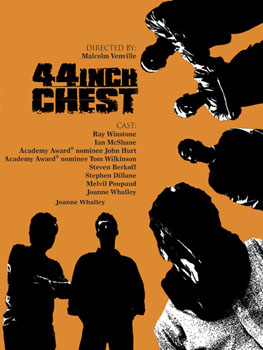
44-INCH CHEST
UK, 2009, 94 minutes, Colour.
Ray Winstone, John Hurt, Ian Mc Shane, Tom Wilkinson, Stephen Delane, Melville Poupaud, Joanne Whaley, Steven Berkoff.
Directed by Malcolm Venville.
Despite the prevalence of swearing and coarse language, it is still not usual to begin a review of film by mentioning the language first. However, 44 Inch Chest is a film about language, good and bad. The bad language is enough to drive many of the average audience from the cinema so coarse is it and so wearing and wearying as it grates on the ear and the sensibilities. Repetitious is an understatement. And, as spoken by some of Britain's top character actors, it sometimes seems incongruous and seems more of a performance rather than language that comes naturally. So, the warning comes first.
What can be said about the film, which was written by Louis Mellis and David Cinto, responsible for Sexy Beast, is that seems more like a play, even a radio play, with the strong emphasis on language (and the strong language). Most of the action, such as it is, takes place in one dingy room and in the stairwell and hallway outside the room.
This means that the emphasis is on characters and characterisation.
At the opening, Colin Diamond (Ray Winstone) seems to be lying dead while Harry Nilsson is singing in the background. But he is not dead, just devastated by his wife's announcement that she is leaving him for another man. His friends rally to support him and abduct the man, a French waiter, and lock him in a wardrobe. For most of the film, they talk, they argue, they try to persuade Colin to come out of it. They deliver themselves of opinions on all kinds of topics, very male and very macho and are waiting for Colin to kill the waiter.
The friends seem to be thugs of one kind or another. Tom Wilkinson is the ordinary bloke who lives with his old mother and seems to be a good mate. On the other hand, Ian Mc Shane plays a more suave character (and excels in his delivery and sense of menace) who is gay and self-centred. Stephen Dillane is the follower. And John Hurt is the old man who belongs to the days of the Krays and their codes for old-fshioned gangster behaviour. Joanne Whalley is the wife and Melvil Poupard (who has no dialogue but is able to convey his depression at being taken and held) is the waiter.
Do they have thug versions of Waiting for Godot? 44 inch chest seems to be making a claim for a position to the left of centre in the Godot field.
1.Expectations of a British gangster film? London? Thugs? The strong cast?
2.A film of words rather than action? The issues of language, the choices of language? Credible language?
3.The interiors, the room and the stairwell? Claustrophobic?
4.The initial action, the abduction? The end in the streets?
5.The screenplay as theatrical, the possibility of its being staged as a play, as a radio play? The verbal impact?
6.The opening, Harry Nilssen and the song, Colin Lying on the floor, audiences wondering whether he was dead or not? His being upset, his wife leaving him, depression?
7.The call to Archie, Archie and his age, at home with his mother, the meals, watching television? His accent? His work? Arriving, care for Colin, relationship with the others?
8.The introduction to Meredith, with the naked young man? His camp style? His homosexuality as an issue, supremely confident, superior to the others, his relationship with the group, interactions with them? Strong-minded?
9.The old man, his name of Peanut, age, an old-time in terms of gangsters, values? His language, teeth? Violence, his expectations, narrow perspective?
10.Mal, a friend, his contribution to the gang, his background, others suspicious of him?
11.Tippi, at the club, atmosphere, sinister?
12.The insertion of the flashbacks, Liz, her relationship with Colin, with the waiter, in love, the confrontation with Colin, determining to leave him?
13.The waiter, the abduction, his being kept in the cupboard? His not saying any words throughout the film? His being tied up, taunted, the threats? Finally let go?
14.Colin asking the others to go out of the room, the Harold Pinter-like chatter in the stairwell? Television programs, memories? Their expectations of what Colin would do to the waiter, wanting violence, coming back into the room?
15.Colin, his memories, the fantasy and the imagination about his wife, taunting the waiter, his anger, letting him go?
16.Catharsis for Colin? The effect of this experience for the other members of the group? For the audience?